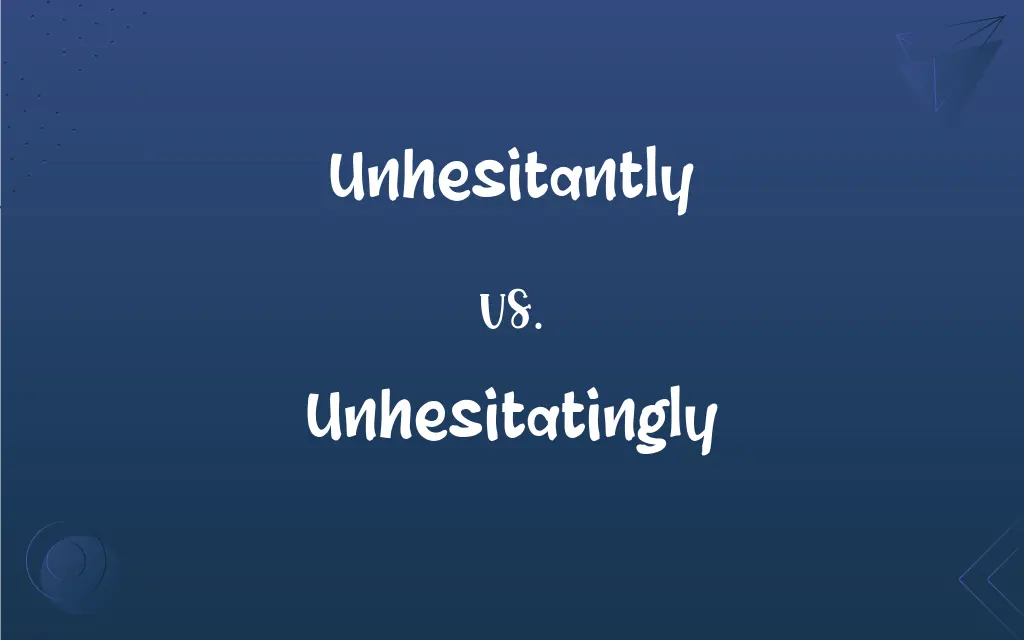Unhesitantly vs. Unhesitatingly: What's the Difference?
Edited by Aimie Carlson || By Harlon Moss || Published on March 21, 2024
"Unhesitantly" implies acting without hesitation or delay, while "unhesitatingly" suggests doing something promptly and without any doubt.

Key Differences
Unhesitantly and unhesitatingly both describe actions performed without pause or delay, but with subtle differences. Unhesitantly often refers to the absence of physical hesitation, such as in movements or decisions. In contrast, unhesitatingly implies a deeper level of confidence and conviction, often encompassing both physical and mental readiness.
When someone acts unhesitantly, they do so without second-guessing or waiting. This word is typically used to describe quick decisions or actions, emphasizing the lack of physical delay. On the other hand, unhesitatingly not only refers to the absence of physical delay but also suggests the absence of doubt or reluctance, portraying a more comprehensive sense of immediacy and assurance.
In the realm of decision-making, unhesitantly suggests a focus on the speed of the decision itself. It’s about promptly choosing a course of action. Conversely, unhesitatingly conveys a sense of not only quick decision-making but also doing so with full confidence and without any doubts, often implying a moral or intellectual sureness.
In literature and speech, unhesitantly is often used to describe characters or actions that are quick and decisive. Unhesitatingly, however, is more likely to be employed when highlighting the resolve or moral certainty behind an action, painting a picture of someone acting with not just speed but with unwavering conviction.
Unhesitantly can be associated more with physical actions, like stepping forward or beginning a task without pause. In contrast, unhesitatingly often has a deeper, more emotional or intellectual connotation, such as expressing an opinion, offering help, or making a choice where the emphasis is on the lack of doubt or moral hesitancy as much as on the quickness of the action.
ADVERTISEMENT
Comparison Chart
Primary Implication
Quick action or decision
Quick action or decision with confidence
Focus
Speed of action
Speed and confidence in action
Usage Context
Often physical actions
Both physical and moral/intellectual actions
Connotation
Absence of delay
Absence of doubt and delay
Typical Usage
Decisions, movements
Decisions, expressions of opinion
ADVERTISEMENT
Unhesitantly and Unhesitatingly Definitions
Unhesitantly
Immediate action without second thoughts.
He unhesitantly ran towards the emergency.
Unhesitatingly
Deciding or responding with certainty.
She unhesitatingly declined the dubious offer.
Unhesitantly
Quick to act or respond.
He unhesitantly jumped into the conversation.
Unhesitatingly
Displaying assuredness in decisions or actions.
She unhesitatingly took the lead in the project.
Unhesitantly
Acting promptly without delay.
She unhesitantly accepted the job offer.
Unhesitatingly
Embarking on actions without doubt.
He unhesitatingly supported his friend in need.
Unhesitantly
Making decisions without hesitation.
She unhesitantly chose her favorite dress.
Unhesitatingly
Acting promptly and confidently.
He unhesitatingly spoke up for his beliefs.
Unhesitantly
Proceeding without pause.
She unhesitantly entered the competition.
Unhesitatingly
Acting swiftly with full conviction.
He unhesitatingly volunteered for the task.
Unhesitantly
In an unhesitant way; immediately, without hesitation.
Unhesitatingly
Acting with or characterized by promptness or resolution
I gave my unhesitating approval.
Unhesitatingly
In an unhesitating manner.
Unhesitatingly
Without hesitation;
She said yes unhesitatingly
FAQs
What does "unhesitantly" mean?
It means acting quickly without any delay.
Can "unhesitantly" and "unhesitatingly" be used interchangeably?
While similar, they have subtle differences; "unhesitatingly" often adds an element of confidence.
Are these words commonly used in everyday language?
They are more common in formal or literary contexts.
Can "unhesitantly" be used to describe emotional responses?
It's less common but can be used to describe quick emotional reactions.
Can "unhesitantly" be used in a business context?
Yes, particularly to describe quick decision-making.
Is "unhesitantly" more about physical actions?
Yes, it often refers to the speed of physical actions or decisions.
What does "unhesitatingly" imply?
It implies acting quickly with confidence and without doubt.
Does "unhesitatingly" imply a moral conviction?
Yes, it can imply moral or intellectual sureness in addition to quickness.
Can "unhesitantly" indicate a lack of planning?
Not necessarily; it implies quick action, not necessarily unplanned action.
Does "unhesitatingly" suggest a higher degree of certainty than "unhesitantly"?
Yes, it often implies more confidence and certainty.
Is "unhesitantly" more common in spoken or written English?
It's more commonly found in written English.
Is "unhesitatingly" suitable for describing actions in a crisis?
Yes, especially when actions are taken with confidence and decisiveness.
Are there synonyms for "unhesitantly" and "unhesitatingly"?
Yes, words like "promptly," "immediately," and "readily" are similar in meaning.
Is "unhesitatingly" appropriate for describing quick intellectual decisions?
Yes, it's suitable for decisions made quickly and with confidence.
Can "unhesitatingly" be used in a negative context?
Yes, it can be used to describe actions taken with confidence, even if they are negative.
Can "unhesitantly" be used to describe reflex actions?
Yes, it's suitable for actions taken without conscious deliberation.
Is "unhesitantly" a commonly misused word?
It's not commonly misused, but it's less commonly used than "unhesitatingly."
Can "unhesitatingly" be used to describe emotional support?
Yes, particularly when the support is given confidently and without doubt.
Does "unhesitatingly" imply a lack of reflection?
Not necessarily; it implies quick action with confidence, not a lack of thought.
Are these words formal or informal?
They are more formal in usage.
About Author
Written by
Harlon MossHarlon is a seasoned quality moderator and accomplished content writer for Difference Wiki. An alumnus of the prestigious University of California, he earned his degree in Computer Science. Leveraging his academic background, Harlon brings a meticulous and informed perspective to his work, ensuring content accuracy and excellence.
Edited by
Aimie CarlsonAimie Carlson, holding a master's degree in English literature, is a fervent English language enthusiast. She lends her writing talents to Difference Wiki, a prominent website that specializes in comparisons, offering readers insightful analyses that both captivate and inform.































































